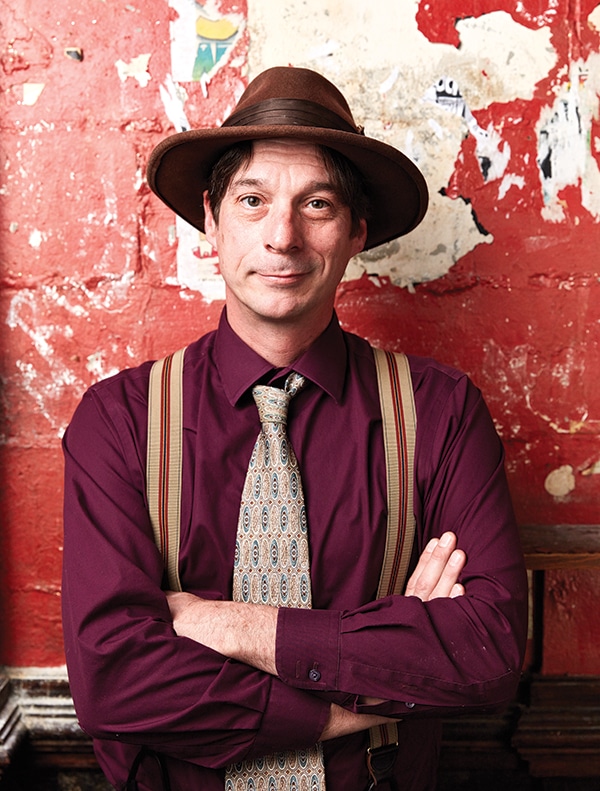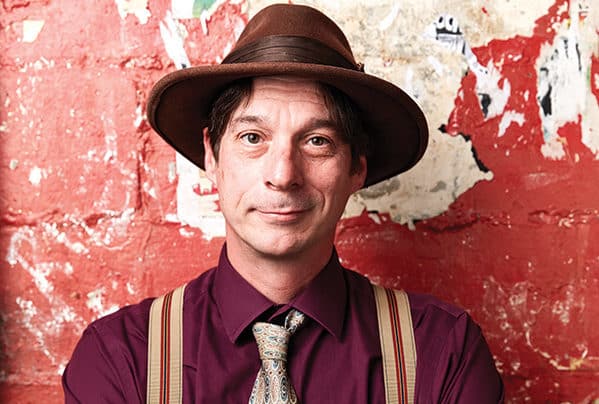Songwriter, guitarist, farmer, podcaster– all of these titles are appropriate when describing Atlanta-based bluesman Danny Dudek otherwise known as Mudcat. For the last thirty-plus years, he has been bringing new light to the earliest sounds of American music. The buzz of his green glass slide sizzling up and down the neck of his resonator guitar mixed with his Depression-era aesthetic of suspenders, fedora, and wide tie creates an energy that’s as old as the tunes themselves. His jaunty and swinging take on blues and folk resounds as a celebration that welcomes the listener to a holy place somewhere between the juke joint and the church house where the spirit is always moving. I recently got to have a conversation with Mudcat about his music and career ahead of his August 13th show at historic Grant’s Lounge.
MM- I get a sense that you’ve been around for a little while given your long catalog of releases. How long have you been chasing the music?
DD- I was 17 when I started playing on the street. I’m from Savannah originally and began busking there on Tybee and on River Street. Then I went and busked around New York, Texas, and New Orleans for years. I then moved to Atlanta about thirty years ago and settle down here.
Well, have you been making blues your whole life?
Yeah, but it’s not all blues. I suppose it’s all blues philosophically, but technically speaking I throw some different stuff in there. The blues genre is where I feel most comfortable though, and I do lean pretty heavy on it sometimes. But it’s like somebody asked an old player how many types of blues were there, and he said there are as many different types as there are players.
How would you describe your work?
I would say folk. Or better yet maybe just American music. Though, I’ve even been deeply influenced by world music from Africa and Spain. But I guess that’s still American ’cause it’s the whole melting pot thing. Oh, I know what– I would say the best description is like the old Professor Longhair album, Rock ‘N’ Roll Gumbo.
I see you play Piedmont [style], what got you into that?
Well, you know Blind Willie McTell was around here. Also, Curley Weaver and his daughter Cora Mae Bryant, who was one of my biggest teachers. Also Cootie Stark. I started getting into those guys when the reissues of those old albums started coming out in the late ’80s, early ’90s. It was funny because my friends in Europe had that stuff for years, but it finally came back over here. When we all got it and started listening to it, we started reading the liner notes. Then we saw that a lot of those guys had been playing on the streets themselves and we just started picking up all the parallels. That type of music is also easily self-contained, so you don’t necessarily need full ensembles, you can just have one or two folks and have a full sound.
Yeah, I guess that lends itself to the required mobility of busking.
Amen, brother.

So when I was looking over your website and reading about your career, I saw that you had some connections with the city of Macon and some famous artists from here.
Oh, yeah, man! I was a part of an organization called the Music Maker Relief Foundation that helps elderly musicians. Bill Lucado hosted a fishing tournament to raise money for the organization in Costa Rica, and he was able to get Dickey [Betts] and Taj [Mahal] to go down. It was really awesome getting to go down and hang out with those folks. Yeah, Dickey was a real sweetheart and super encouraging to me. I was kind of shocked because I had, of course, grew listening to him. In fact, one of the things I loved about that trip is that I had always thought that as a slide player, I gravitated more towards Duane’s playing. But Dickey played slide too, and it wasn’t until I got older that I realized it was his stuff I was gravitating to more on those old records. And so then getting to meet him just seemed right!
I’ve also seen that you have had some pretty large bands with you at some shows, including horn sections and whatnot. Are you still doing that these days? And will that be what you’re bringing to Grant’s?
Yeah, man, I used to have an eleven-piece band, but right before the pandemic, I started playing solo more. Since then, I really don’t get out a whole lot, you know? I haven’t been going to jam sessions or just going to clubs to hang out. I go to work and then try to get back to the farm. I don’t want to be the one that spreads any sickness. So this is kind of a rare gig for me, at least recently, but I just really love Wes [Griffith] and Grant’s, and I love what they’re doing so, of course, I said yes. Man, I’ve been down to Grant’s Lounge with Taj Mahal, and it’s such a special room that I am proud to come back to. All we really need to do is show up and plug into the vibe.
